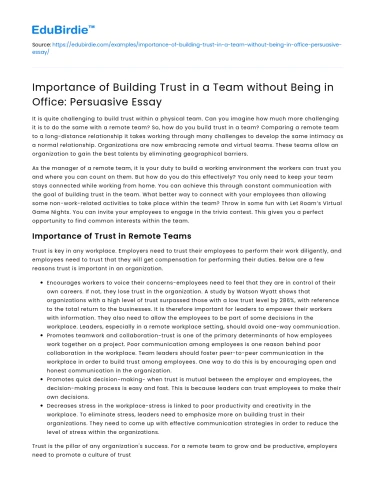It is quite challenging to build trust within a physical team. Can you imagine how much more challenging it is to do the same with a remote team? So, how do you build trust in a team? Comparing a remote team to a long-distance relationship it takes working through many challenges to develop the same intimacy as a normal relationship. Organizations are now embracing remote and virtual teams. These teams allow an organization to gain the best talents by eliminating geographical barriers.
As the manager of a remote team, it is your duty to build a working environment the workers can trust you and where you can count on them. But how do you do this effectively? You only need to keep your team stays connected while working from home. You can achieve this through constant communication with the goal of building trust in the team. What better way to connect with your employees than allowing some non-work-related activities to take place within the team? Throw in some fun with Let Roam’s Virtual Game Nights. You can invite your employees to engage in the trivia contest. This gives you a perfect opportunity to find common interests within the team.
Save your time!
We can take care of your essay
- Proper editing and formatting
- Free revision, title page, and bibliography
- Flexible prices and money-back guarantee
Importance of Trust in Remote Teams
Trust is key in any workplace. Employers need to trust their employees to perform their work diligently, and employees need to trust that they will get compensation for performing their duties. Below are a few reasons trust is important in an organization.
- Encourages workers to voice their concerns-employees need to feel that they are in control of their own careers. If not, they lose trust in the organization. A study by Watson Wyatt shows that organizations with a high level of trust surpassed those with a low trust level by 286%, with reference to the total return to the businesses. It is therefore important for leaders to empower their workers with information. They also need to allow the employees to be part of some decisions in the workplace. Leaders, especially in a remote workplace setting, should avoid one-way communication.
- Promotes teamwork and collaboration-trust is one of the primary determinants of how employees work together on a project. Poor communication among employees is one reason behind poor collaboration in the workplace. Team leaders should foster peer-to-peer communication in the workplace in order to build trust among employees. One way to do this is by encouraging open and honest communication in the organization.
- Promotes quick decision-making- when trust is mutual between the employer and employees, the decision-making process is easy and fast. This is because leaders can trust employees to make their own decisions.
- Decreases stress in the workplace-stress is linked to poor productivity and creativity in the workplace. To eliminate stress, leaders need to emphasize more on building trust in their organizations. They need to come up with effective communication strategies in order to reduce the level of stress within the organizations.
Trust is the pillar of any organization's success. For a remote team to grow and be productive, employers need to promote a culture of trust. Here are a few tips to help an employer foster trust in a remote team.
1. Promote Transparency
As mentioned earlier, it is essential to share information openly with the team members. Managers should be a good example to the team by being transparent. They should ensure an easy flow of team information like work schedules, task statuses, and project progress. The following channels will help team members to share ideas with each other.
- Synchronous channels- mostly used for urgent cases. Remote employees use these channels for urgent questions and requests. They include video calls, live chats, virtual meetings, and phone calls.
- Asynchronous channels-these are channels that encourage open-minded communication. They include text messaging, social media messaging, etc. the channels have slow response times.
A mix of both communication options ensures that coworkers in a remote team have a way to stay connected, irrespective of the communication style used. An employer should insist on frequent communication in the team, to make sure everyone agrees on work issues. This way, team members will be more connected and able to build trust.
2. Create Unity in the Team
Managing a team of remote workers is not an effortless task. But it is a necessity if you want your business to thrive. One of the best ways is by creating unity in your team. Make all employees, regardless of their position, feel like an important part of the team. Employees give their best when they feel important in a team. The unity will create swift trust where people can trust each other even when they are strangers. As a team leader, you should be able to identify the skills and capabilities of your team members. In this case, everyone concentrates on their skill abilities, resulting in incredible work productivity.
3. Set Clear Goals and Objectives
Another great way to build trust in a team is to set goals, purposes, and priorities. The leaders share them with the other members. In addition, every person on the team should know the scope of work and their responsibility. Besides increasing productivity, this will keep the employees motivated.
Team managers must be clear on how employees should communicate their work. Some managers may want to know the progress on a daily basis, others on a weekly basis, and others on a monthly basis. Sharing the preferred schedule gives the worker something to work from and makes them know when and how to tell their managers they need help.






 Stuck on your essay?
Stuck on your essay?

